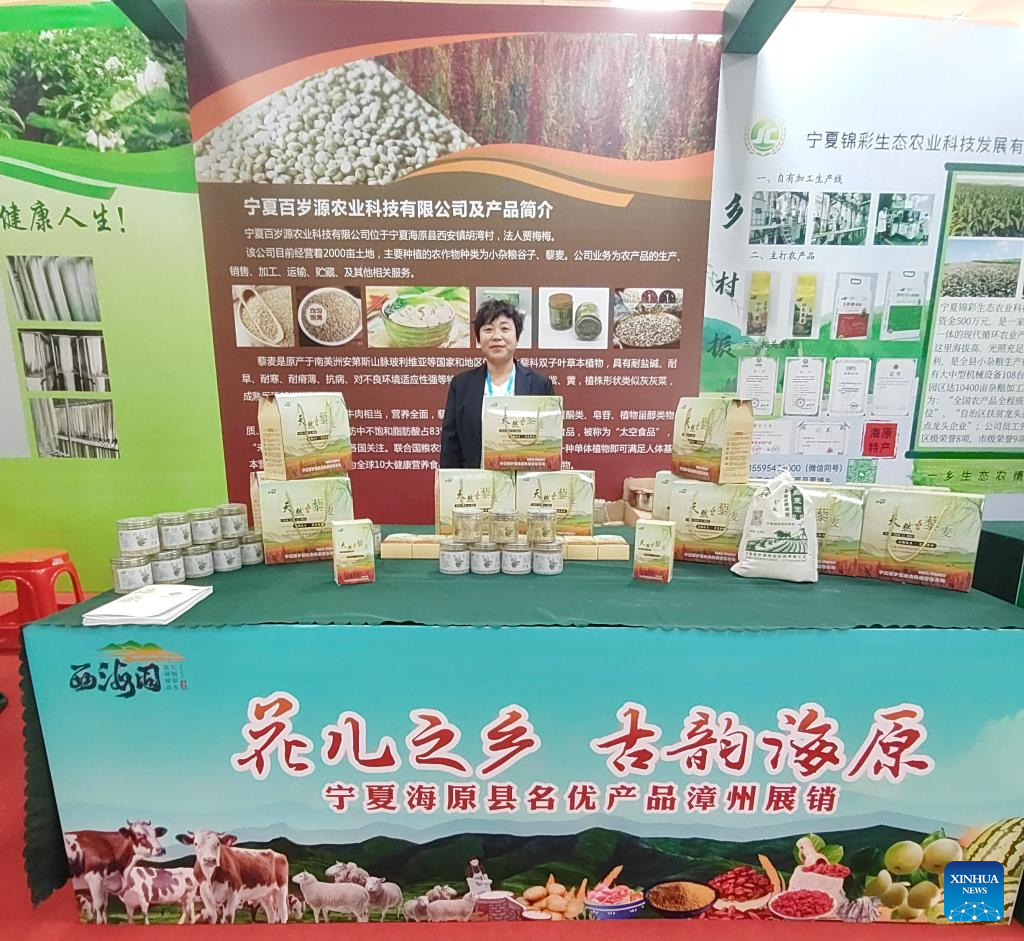
This file photo taken in November 2023 shows Jia Meimei promoting products of her farm at a trade fair in Zhangpu County, Zhangzhou, southeast China's Fujian Province. (Xinhua)
YINCHUAN, Aug. 1 (Xinhua) -- When Jia Meimei decided to return to her rural hometown seven years ago to start a business, financial challenges initially impeded her progress until she discovered a local guaranteed loan project supporting women entrepreneurs in rural areas.
"I filled out a form and had it endorsed by the women's federation, after which I successfully received an interest-free loan of 50,000 yuan (about 7,008 U.S. dollars)," explained Jia, now 44.
With this funding, she acquired 20 hectares of land to grow cumin and quinoa in her home village of Wuyuan in Haiyuan County, northwest China's Ningxia Hui Autonomous Region.
Cumin is a local specialty while quinoa is a new crop to the area. To gain expertise in these crops, Jia and her husband attended training sessions and honed their planting skills through hands-on experience.
"Quinoa has high nutritional value and promising yields. I have established my own sales channels, and the income is quite good," Jia said.
In 2017, Jia expanded her operations by establishing a family farm, and has so far acquired over 133 hectares of land. The farm employs 15 villagers full-time and over 100 part-time.
From 2019 to 2022, Jia secured two additional loans guaranteed by the local women's federation totaling 500,000 yuan. "Expanding farming operations requires substantial upfront investment, especially since income is realized only after harvest. These loans were crucial during challenging times," she said.
Inspired by her success, Jia has actively shared her journey with other local women, encouraging them to explore similar opportunities through guaranteed loans.
To support women like Jia, the regional women's federation has launched the "Malan Flower" entrepreneurship support project, offering financial aid like guaranteed loans and skills training to rural women interested in business in agriculture, animal husbandry, tourism, e-commerce and handicrafts, among other fields.
Liu Xiaoli, a resident of Xiongying Village in Yinchuan, capital of Ningxia, also benefited from this project. She and her husband initially struggled with their agritainment business until they secured two guaranteed loans totaling 800,000 yuan to establish a food company specializing in fresh corn processing, achieving annual sales of 2 million yuan.
In addition to financial support, many rural women in Ningxia have gained from skill training. In the Yuanzhou District of Guyuan City, over 500 women have received crochet training, and they are now earning an average of 2,000 yuan per month.
More supportive policies and measures will be introduced to assist women in rural areas of Ningxia. The regional women's federation plans to cultivate three to five leading female entrepreneurs in each of the 2,200 villages across Ningxia within five years, aiming to raise the incomes of over 100,000 women. ■



